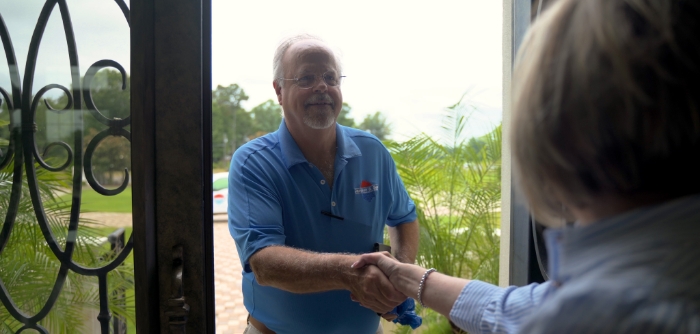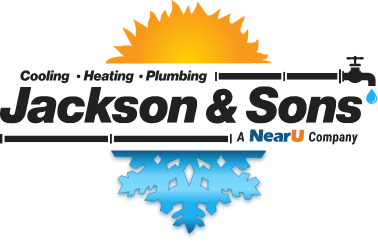Air Conditioning Replacement
Expert Air Conditioning Replacements and New Home Installations Throughout Eastern NC
Is your old air conditioning unit becoming unreliable? Are your AC bills skyrocketing? If so, then it may be time to invest in a new air conditioning unit. When it comes to choosing a company for your air conditioning replacement, you want someone who offers reliable AC products and provides meticulous installation so that your AC unit is the perfect fit for your home or business. With highly qualified licensed and insured cooling technicians, Jackson & Sons fits the bill! Located near Goldsboro, NC, we serve residential and commercial clients in Wayne, Johnston, Pitt Counties and throughout Eastern NC.

Air Conditioning Replacement FAQs
AC units in North Carolina generally have a lifespan of about 10 to 15 years, sometimes longer. However, this can depend on several variables such as the quality of the unit, how well it's maintained, and the climate. The hot and humid summers in North Carolina put significant demands on AC systems, potentially shortening their lifespan. Regular maintenance, that includes thorough cleaning, replacing filters, and inspections of all working parts and ductwork can extend their life, as can choosing a high-quality unit and professional installation. Monitoring your system's efficiency and consulting an HVAC expert like Jackson & Sons can help determine the optimal time for replacement to ensure continued comfort and energy efficiency.
The best time to replace an AC is during the shoulder seasons, which are spring and fall. These periods typically have milder temperatures, reducing the immediate urgency for cooling. In spring, you can ensure your AC is ready for the upcoming hot summer months, and in the fall, you'll have ample time to replace or upgrade the system before the colder winter weather sets in. This timing allows for more flexible scheduling with HVAC professionals, potentially shorter wait times, and sometimes even cost savings on equipment and installation due to lower demand.
Yes, rebates and tax credits can be available for AC installation, aimed at encouraging energy efficiency and reducing environmental impact. These incentives can vary significantly by location, time, and the specifics of the system being installed:
- Federal Tax Credits: The U.S. government occasionally offers tax credits for installing energy-efficient HVAC systems. These credits can change based on federal energy policies.
- State and Local Incentives: Many states, counties, and municipalities offer their own rebates and incentives for energy-efficient appliance installations, including air conditioners.
- Utility Company Rebates: Some utility companies provide rebates to customers who install energy-efficient HVAC systems to reduce overall energy demand.
- Manufacturer Rebates: HVAC manufacturers may offer seasonal rebates or promotions on certain energy-efficient models.
To find out what incentives are currently available, check with the ENERGY STAR website, your local government energy office, your utility provider, or the HVAC system manufacturer. It's also beneficial to consult with an HVAC professional who can provide up-to-date information on qualifying systems and the documentation required to apply for these incentives.
To determine the appropriate size AC unit for your home or building, you need to consider several factors. First, calculate the square footage of the area that needs to be cooled. Then, account for elements like ceiling height, number of windows and their exposure, insulation levels, and the climate in your region. Building usage and occupancy levels also play a role. Generally, you'll need around 20-30 BTUs per square foot for optimal cooling. However, it's best to have an HVAC professional conduct a thorough load calculation to ensure proper sizing and energy efficiency. Oversized or undersized units can lead to inefficient cooling and higher energy costs.
Upgrading to a more energy-efficient AC unit offers numerous benefits, including significant energy savings and lower utility bills. These units provide improved cooling performance and better temperature control. They often feature advanced technology like variable-speed compressors for enhanced comfort. Energy-efficient models have a smaller environmental impact due to reduced energy consumption and use of eco-friendly refrigerants. They typically offer quieter operation and longer lifespans. Many qualify for tax incentives or rebates, offsetting initial costs. Upgraded units can also increase home value and appeal to environmentally conscious buyers if you're considering selling.
Cooling System Replacement and Installation Services
Our replacement and installation services include:
- Heat Pumps
- Central Air Conditioning Systems
- Split System
- Packaged Units
- Ductless Units
- Rooftop Units
Our Air Conditioning Installation Process
The heating, cooling, and ductwork design is imperative in both HVAC home replacements and new home installations. The type of system purchased and the layout of the heating and cooling systems are both critical components to the comfort of the home. The professionals at Jackson & Sons will design and install a home comfort system that will perfectly fit the comfort needs of your home.
How do you know when it's time to replace your air conditioning unit?
- Your existing AC unit is 10-15 years old, or even older
- Your existing air conditioner is not cooling to comfortable temperatures
- The temperatures in your home or business are inconsistent
- Your energy bills are high due to older, inefficient air conditioning technology
- Repairs are costly, and your existing AC unit is no longer under warranty
- Your needs have changed because of a recent addition to your space
Financing
We understand that an unexpected AC replacement can strain your budget. That's why we offer flexible financing options to help you manage the cost while enjoying the benefits of a new, efficient AC unit. Our financing plans are designed to accommodate your financial situation and provide you with peace of mind - all while you are comfortable in your own home!
Utility Rebates
You may be surprised how much money you can get back on a new energy-efficient system from your utility company. At Jackson & Sons, we are experts on navigating the extra savings that come with filing for the right rebate. When you work with us on your AC installation, we'll get back every penny out there you've earned.
Get Started On Comfort Today!
When you're ready to enhance your comfort with a new air conditioner, Jackson & Sons is here to provide top-tier installation services. Contact us today to schedule a free consultation and take the first step towards a cooler and more comfortable environment.

